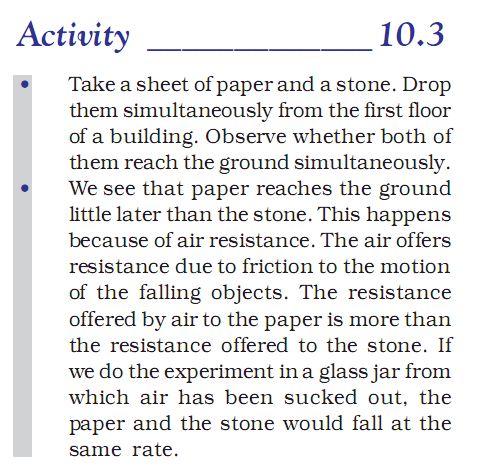Activity 10.3 Class 9 Science Gravitation Chapter 10
What activity asks?
Activity 10.3 asks us to drop a piece of paper and stone from some height and see which reaches the ground first. The activity also asks us to do the same thing in a vacuumed glass.
Observation:
The stone reaches fast while paper arrives at the bottom late.
Explanation:
We all know that earth attracts all the object with the force proportional to the mass of the object.
F= GMm/R2
(Where G is the universal gravitational constant; M is the mass of the earth; m is mass of the object, and R is the radius of the earth.)
⇒ma=GMm/R2
⇒a=GM/R2
Thus we see that all the body falls with the same acceleration. We call this Acceleration due to gravity (g). Its value is 9.8m/s2.
But this does not happen in reality. Other forces come into play in a free fall. For example Friction due to air. Light objects like paper have a higher surface area. They offer higher resistance to the air; while the stone is heavy with a small source area. Stone offer lower friction with the air. As a result, when we fall paper and stone at the same time, stone reaches the ground fast.
A glass from which air is drawn out does not offer any resistance whether it is a stone or a paper or something else. As a result, all the objects fall at the same speed and reach the bottom simultaneously.
Next: Activity 10.4 Class 9 Science Gravitation.
See also: Activity 10.2 Class 9 Science Gravitation.
Ref: Chapter 10.
Activity 10.3 Class 9 Science Gravitation Chapter 10
*********∼∼∼∼∼∼∼∼*********
